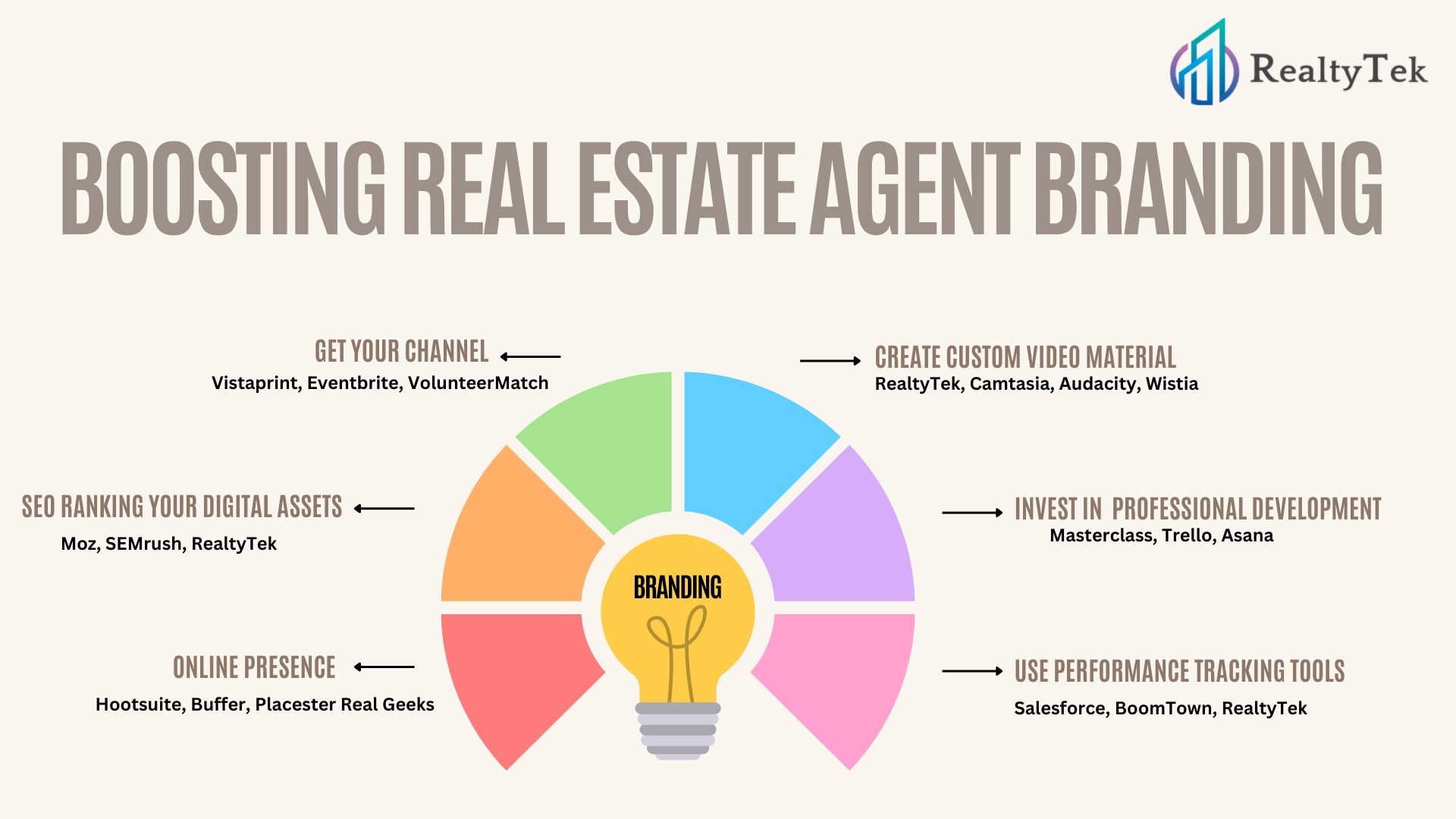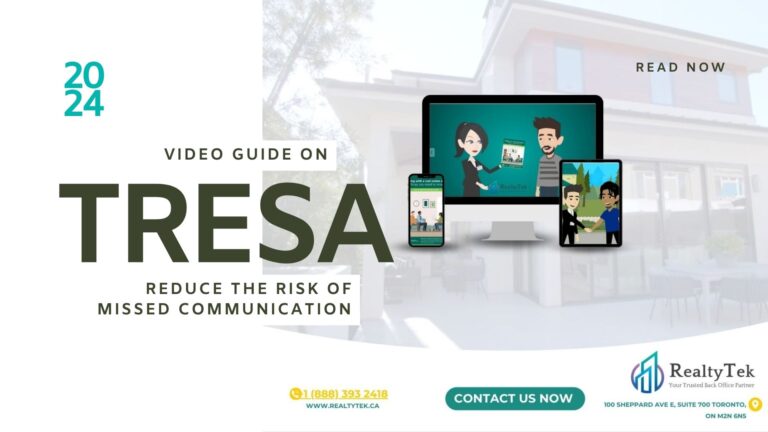In today’s fiercely competitive real estate market, effective branding is no longer just about eye-catching logos and cohesive color schemes. It’s about crafting a distinctive presence that sets your brokerage and agents apart from the crowd. As a broker-owner, your success hinges on your agents’ visibility and performance. Let’s explore strategic approaches to enhance your agents’ profiles while elevating your brokerage’s brand.
Contents:
- Maintain a Strong Online Presence
- Use SEO Strategies for Ranking Your Digital Assets
- Get Your Channel
- Create Custom Video Material
- Invest in Continuous Professional Development
- Use Performance Tracking Tools

1. Maintain a Strong Online Presence
Empower your agents with a robust online presence, a non-negotiable in today’s digital age. It’s the primary avenue for them to showcase their expertise, promote listings, and connect with potential clients. With most homebuyers and sellers starting their search online, having a well-optimized, professional online profile is critical for success in the competitive real estate market.
Why Online Presence Matters:
In a world where consumers increasingly rely on digital platforms for information and services, an effective online presence helps build credibility and trust. It allows agents to present themselves as knowledgeable and approachable professionals, facilitating stronger connections with potential clients. Furthermore, an active online presence enables agents to leverage digital marketing tools, engage with their audience, and stay top-of-mind when clients are ready to make decisions.
What You Can Do:
- Encourage Agents to Create and Maintain Professional Websites: A dedicated website allows agents to highlight their services, showcase their listings, and share valuable content, such as market insights and homebuying tips. This positions them as experts and serves as a central hub for their online activities.
- Develop Active Social Media Profiles: Agents should maintain profiles on platforms like Facebook, Instagram, LinkedIn, and Twitter. These platforms offer opportunities for engagement, allowing agents to share updates, interact with followers, and showcase properties visually appealingly.
- Implement Targeted Advertising Strategies: Utilize geo-targeting to reach potential clients in specific neighborhoods. This ensures that ads are shown to individuals most likely to engage with the content. Additionally, retargeting ads can remind website visitors of properties they viewed, increasing the likelihood of conversions.
What You Will Need:
- One essential resource you’ll need is an advertising Agency. Partnering with specialized agencies, such as Sotheby’s International Realty or Real Estate Marketing, can be instrumental in designing and managing effective advertising campaigns tailored to your brokerage’s needs. These agencies understand the nuances of real estate marketing and can optimize your ad spend for maximum reach and impact. Content Calendar Tools: Consistent content scheduling is vital for maintaining engagement. Tools like Hootsuite or Buffer allow agents to plan, schedule, and analyze their social media posts, ensuring a steady flow of content that keeps followers informed and engaged.
Additional Resources:
- Website Builders: Consider platforms like Placester or Real Geeks for real estate-specific website solutions. These builders offer customizable templates for real estate professionals, enabling agents to create visually appealing and functional websites without extensive technical skills.
- Social Media Management: To streamline social media efforts, tools like Sprout Social provide comprehensive management features, including scheduling, analytics, and engagement tools. This helps agents maintain an active presence, monitor their audience, and refine their strategies based on performance insights.
- Blogging Platforms: Encourage agents to share their expertise through blog posts. Platforms like WordPress or Wix offer easy-to-use blogging capabilities that integrate with their websites, providing valuable content that can attract visitors and improve SEO.
2. Use SEO Strategies for Ranking Your Digital Assets
Search engine optimization (SEO) ensures your agents’ online visibility. In an era where potential clients turn to search engines to find local real estate services, a strong SEO strategy can significantly enhance your agents’ chances of being discovered.
Understanding SEO in Real Estate:
SEO involves optimizing digital content to rank higher in search engine results, making it easier for potential clients to find your agents when they search for relevant terms like “real estate agents near me” or “homes for sale in [Your City].” Real estate is often a local business, so local SEO is essential. This strategy targets geographic-specific searches to connect agents with clients in their immediate areas.
What You Can Do:
- Keyword Research: Start by identifying the keywords and phrases potential clients use to search for real estate services. Use tools like Google Keyword Planner or Ahrefs to find relevant keywords. Focus on long-tail keywords, such as “first-time homebuyer agent in [Your City],” which may have less competition and attract more qualified leads.
- On-Page Optimization: Optimize each agent’s website and social media profiles by incorporating identified keywords into titles, meta descriptions, headings, and content. For example, an agent’s bio could include phrases like “experienced realtor in [Your Neighborhood]” to enhance local relevance.
- Content Creation: Develop valuable content that addresses common questions and concerns potential clients may have. Blog posts, articles, and guides about local market trends, homebuying tips, or neighborhood highlights can position your agents as experts in their field. Regularly updated content signals to search engines that your site is active and relevant.
- Local Listings and Citations: Ensure your agents are listed on local business directories and real estate platforms like Yelp, Zillow, and Realtor.com. Consistent business information across these platforms—such as name, address, and phone number (NAP)—helps boost local search rankings.
- Google My Business: Claim and optimize your agents’ Google My Business profiles. This tool allows agents to manage their online presence across Google, including search and maps. An optimized profile includes up-to-date contact information, office hours, and high-quality images, increasing the likelihood of appearing in local searches.
What You Will Need:
- SEO Tools: Utilize tools like Moz, SEMrush, or Yoast SEO for WordPress to help analyze your website’s SEO performance and identify areas for improvement.
- Content Management System (CMS): A user-friendly CMS like WordPress or Wix allows agents to easily update their content and implement SEO best practices without extensive technical knowledge.
- Keep your agents motivated and inspired by Providing access to online courses or workshops on SEO fundamentals through platforms like Udemy or LinkedIn Learning. This ongoing training ensures they stay updated on the latest SEO trends and practices, keeping them at the top of their game. Content management partner: Choose a content partner with experience working in the real estate sector, like Realtytek.ca, to create a personalized website for your agents with regular content updates that will help them rank.
Cultivate a solid local presence to foster a sense of community. This is where your agents live, work, and serve, and it’s crucial to establish a strong connection with the local community. Building trust within the community is invaluable for real estate success. In an industry where relationships and reputation are paramount, being recognized as a reliable and knowledgeable agent can lead to referrals, repeat business, and a solid client base. A robust local presence enhances visibility and credibility, making it easier for potential clients to feel comfortable reaching out.
Why a Local Presence Matters:
A robust local presence helps agents connect with their community and establishes them as trusted authorities in real estate. People prefer working with agents who understand their neighborhoods, local market trends, and community dynamics. By being active in the community, agents can foster relationships, build rapport, and create a network of potential clients who see them as approachable and knowledgeable.
What You Can Do:
- Help Agents Become Recognizable Figures: Equip agents with branding materials that reflect their brand and the brokerage’s identity. This can include business cards, signage, and promotional items like branded apparel. Visibility in the community, whether through physical presence or online engagement, is essential.
- Participate in Local Events: Encourage agents to get involved in community events, such as fairs, festivals, and farmer’s markets. They can set up booths, provide information, and engage with community members. This face-to-face interaction is invaluable for building relationships.
- Sponsor Community Events: To increase brand visibility, consider sponsoring local events or sports teams. This showcases your commitment to the community and aligns your agents with positive local initiatives.
- Engage in Charity Work: Encourage agents to volunteer for local charities or non-profits. This involvement demonstrates a commitment to the community and creates goodwill, further establishing trust among potential clients.
What You Will Need:
- Branding Materials: Use Vistaprint to create consistent branding materials, including business cards, flyers, and banners. High-quality, professional materials enhance agents’ credibility and make a lasting impression.
- Event Sponsorships: Identify community event sponsorship opportunities through platforms like Eventbrite. Sponsoring events not only raise awareness but also creates opportunities for agents to connect with attendees in a meaningful way.
Additional Resources:
- Community Engagement: Utilize VolunteerMatch to find local volunteering opportunities that align with agents’ interests. Volunteering helps agents connect with community members while giving back to those in need.
- Networking Events: Joining local chambers of commerce or using Meetup can help agents find relevant networking events. These gatherings provide excellent opportunities to meet other professionals and potential clients while expanding their network.
- Local Media Involvement: Encourage agents to engage with local media outlets. Writing articles, giving interviews, or appearing on local podcasts can enhance their visibility and position them as experts in their area.
- Community Social Media Groups: Joining local Facebook groups or Nextdoor can help agents stay connected with community discussions and promote their involvement in events or initiatives. This engagement can create a sense of community and encourage referrals.
3. Get Your Channel
In today’s digital landscape, having a personal channel is crucial for real estate agents to share valuable content and engage directly with their audience. Whether through YouTube, podcasts, or other platforms, these channels allow agents to showcase their expertise, tell their stories, and build a loyal following. By leveraging these mediums, agents can foster deeper connections with potential clients, differentiate themselves from competitors, and establish themselves as thought leaders in the industry.
Why Personal Channels Matter:
Personal channels offer agents a unique opportunity to connect with their audience more intimately. Agents can create content that resonates with their community by sharing insights, tips, and stories. This enhances their visibility and builds trust and credibility, making potential clients more likely to reach out when they need real estate services.
What You Can Do:
- Encourage Agents to Create YouTube Channels or Podcasts: Guide agents in setting up their own YouTube channels or podcast series. They can share valuable content such as market updates, homebuying tips, neighborhood tours, and client success stories. Consistent content creation will keep their audience engaged and informed.
- Provide Content Creation and Audience Engagement Training: Offer workshops or training sessions focused on effective content creation strategies. Teach agents to craft compelling narratives, use visuals effectively, and engage their audience through comments and social media interactions. Understanding audience dynamics can help them tailor their content for maximum impact.
What You Will Need:
- Production Tools: Equip agents with user-friendly production tools. Camtasia is an excellent choice for video editing, offering intuitive features for creating polished content. Audacity is a free, open-source tool for audio editing that enables agents to produce high-quality podcast episodes.
- Content Training: Access comprehensive courses on content creation through platforms like Udemy or Skillshare. These platforms provide a wealth of resources on video production, podcasting, and audience engagement, helping agents refine their skills and enhance their content.
Additional Resources:
- Video Hosting: Consider using Wistia for professional video hosting. Wistia offers robust analytics, allowing agents to track viewer engagement and optimize content accordingly. This platform also provides tools for customizing the viewer experience, which can enhance branding.
- Podcast Hosting: Platforms like Libsyn or Buzzsprout are ideal for distributing podcasts. They provide user-friendly interfaces for uploading episodes, managing subscriptions, and distributing content to major podcast directories. Both platforms offer analytics to help agents better understand their audience.
- Social Media Promotion: Encourage agents to promote their videos and podcasts on their social media channels. Platforms like Facebook and Instagram can help agents reach a broader audience and drive traffic to their channels.
- Engagement Tools: Agents can utilize tools like SurveyMonkey or Typeform to gather feedback from their audience. Understanding viewer preferences can help agents tailor their content to better meet their audience’s needs.
4. Create Custom Video Material
Video content is a powerful engagement tool, especially for explaining complex real estate processes. Creating high-quality video material in an industry where visuals attract clients can help agents convey information more effectively, engage their audience, and stand out in a crowded market. From showcasing properties to educating clients about the buying process, custom videos can enhance brand visibility and client trust.
Why Custom Video Material Matters:
Videos allow agents to present information in a dynamic and easily digestible format. They can effectively showcase property features, highlight local amenities, and simplify complex topics like financing or legal requirements. Additionally, video content can foster a more personal connection, as clients can see and hear agents, which builds rapport and trust. Given that video is one of the most consumed forms of content online, investing in this medium is essential for modern real estate marketing.
What You Can Do:
- Produce Engaging Video Content: Encourage agents to create content, including property tours, neighborhood highlights, and informational videos like the TRESA (The Real Estate Standards Act) guidelines. These videos can serve as valuable client resources, demystifying the buying process and compellingly showcasing properties.
- Create Educational Content: Develop videos that discuss local market trends, explain the home buying process, or offer tips for first-time buyers. This positions agents as knowledgeable authorities in their field and helps clients feel more informed and confident in their decisions.
What You Will Need:
- Videography Services: To ensure high-quality production, agents can hire videographers through platforms like Thumbtack for professional services tailored to their needs. For simpler projects, Canva offers user-friendly tools for creating basic videos and animations that can enhance visual appeal.
- Video Distribution: Use platforms like YouTube and Vimeo for hosting and distribution. YouTube is the largest video platform and offers vast reach and SEO benefits, while Vimeo provides a more polished presentation option, ideal for professional portfolios.
- Ready-to-use videos: If you are planning a faster approach to white labeling, use content from a reputed industry leader in real estate services. Realtytek.ca offers TRESA videos for brokerages, teams, and agents.
Additional Resources:
- Video Creation Tools: Consider using tools like Animoto or Lumen5 for easy video creation. These platforms allow agents to create visually appealing videos by integrating photos, text, and music, even without extensive video editing skills.
- Live Streaming: Encourage agents to use live streaming for open houses, Q&A sessions, or community events. Tools like BeLive and StreamYard provide professional-grade streaming capabilities, allowing agents to interact with their audience in real-time and fostering community engagement.
- Video Marketing Strategies: Provide training on video marketing strategies, including optimizing video titles, descriptions, and tags for SEO. This will ensure the videos reach a wider audience and appear in relevant searches.
- Analytics Tools: Analytics from platforms like YouTube or Vimeo can track viewer engagement and retention. Understanding which types of videos resonate most can inform future content creation efforts, allowing agents to tailor their strategies for maximum impact.
5. Invest in Continuous Professional Development
Ongoing training is essential for real estate agents to remain competitive and well-informed in a rapidly evolving industry. As market conditions change, new technologies emerge, and client expectations shift, agents must regularly update their skills and knowledge. Investing in continuous professional development not only enhances agents’ capabilities but also positions them as trusted advisors in the eyes of their clients.
Why Continuous Professional Development Matters:
The real estate market is dynamic, with frequent regulation changes, market trends, and technology. Agents prioritizing continuous learning can better navigate these changes, adapt their strategies, and offer clients the most relevant and up-to-date information. This not only boosts agents’ confidence and performance but also enhances the overall reputation of the brokerage, attracting more clients and top-tier agents.
What You Can Do:
- Offer Regular Training Sessions: Organize workshops and training sessions focusing on essential skills such as industry trends, negotiation techniques, and advanced sales strategies. This can include guest speakers from the industry, interactive role-playing exercises, and case studies that allow agents to learn from real-world scenarios.
- Implement a Structured Mentorship Program: Pairing experienced agents with newer ones fosters knowledge sharing and accelerates the learning curve. A well-structured mentorship program can provide valuable insights, support, and encouragement, helping new agents build their confidence and skills more quickly.
What You Will Need:
- Industry Trainers: Hire industry experts and trainers through LinkedIn Learning or local training institutes. These professionals can provide tailored training sessions that address specific needs within your brokerage, ensuring that agents receive relevant and actionable insights.
- Mentorship Framework: Utilize MentorcliQ to establish a structured mentorship program. This platform offers tools for matching mentors and mentees, tracking progress, and providing resources to enhance the mentorship experience. A well-defined framework ensures that mentors and mentees benefit fully from the relationship.
Additional Resources:
- Online Courses: Provide agents access to platforms like Real Estate Express or The CE Shop for continuing education. These platforms offer a wide range of licensing, compliance, marketing strategies, and more courses, ensuring agents stay current with industry standards and practices.
- Skill Development: Utilize Masterclass for high-quality skill development courses by renowned experts. This platform offers courses on negotiation, sales techniques, and even personal branding, enabling agents to learn from the best in various fields.
- Networking Opportunities: Encourage participation in industry conferences, webinars, and local real estate events. These gatherings provide learning opportunities and foster networking, enabling agents to connect with peers and industry leaders.
- Performance Tracking Tools: Implement tools that help agents set goals and track their professional development progress. Apps like Trello or Asana can create personalized learning plans, ensuring agents remain accountable and motivated in their development journey.
6. Use Performance Tracking Tools
Monitoring performance is crucial for real estate agents to stay on track and identify areas for improvement. In an industry driven by sales volume, client engagement, and market trends, utilizing performance-tracking tools enables agents to measure their progress effectively, set realistic goals, and refine their strategies. This data-driven approach helps agents maximize their productivity and achieve tremendous success.
Why Performance Tracking Matters:
Performance tracking allows agents to gain insights into their strengths and weaknesses, making it easier to adjust their strategies accordingly. By keeping tabs on sales targets and overall performance, agents can make informed decisions about where to focus their efforts, ultimately enhancing their effectiveness and achieving better results. Moreover, consistent tracking fosters accountability, encouraging agents to meet their goals and strive for continuous improvement.
What You Can Do:
- Implement Performance Tracking Tools: Use performance tracking software to monitor sales targets, client interactions, and other key performance indicators (KPIs). This enables agents to see their progress in real-time, assess their performance, and make necessary adjustments.
- Conduct Regular Performance Reviews: Schedule regular performance reviews and goal-setting sessions with agents. This structured feedback process allows for open discussions about challenges, successes, and future objectives. Establishing clear, achievable goals during these sessions can motivate agents and improve performance.
What You Will Need:
- Performance Tracking Software: Use tools like Salesforce for comprehensive customer relationship management (CRM) and performance tracking. Salesforce provides robust analytics, allowing agents to monitor their sales pipelines and identify trends. Alternatively, Trello can be utilized for more straightforward monitoring and project management, enabling agents to visualize their tasks and goals easily.
- Meeting Scheduler: Implement a scheduling tool like Calendly to streamline the process of setting up performance review meetings. This tool helps eliminate back-and-forth emails and makes finding suitable meeting times for agents and managers easy.
Additional Resources:
- CRM Systems: Consider adopting real estate-specific CRM solutions such as BoomTown or Follow Up Boss. These platforms offer integrated tracking features tailored for real estate professionals, helping agents manage leads, track client interactions, and analyze sales performance.
- Goal Tracking: Utilize apps like Strides or GoalsOnTrack for personal goal setting and tracking. These tools allow agents to set specific, measurable goals and monitor their progress over time, ensuring they stay focused and motivated.
- Analytics Dashboards: Consider using data visualization tools like Tableau or Google Data Studio to create dashboards that provide real-time insights into agents’ performance metrics. This visual representation of data can help agents quickly identify trends and areas for improvement.
- Feedback Mechanisms: Implement tools such as SurveyMonkey or Typeform to gather feedback from agents regarding their experiences with tracking tools and performance reviews. This feedback can help refine processes and improve overall effectiveness.
- Custom platforms: Implement a platform custom-built for a real estate brokerage. RealtyTek’s Agents Performance Dashboard is a white-label platform specifically tailored for agent sales data collection and visual presentation.
Conclusion
Building agent visibility is the cornerstone of creating a successful brand for your real estate brokerage. By implementing these strategies and leveraging the suggested digital tools and community engagement techniques, you can significantly enhance your agents’ profiles and your brokerage’s reputation.
Remember, consistency across all branding efforts is crucial. Ensure your messaging aligns with your core values and resonates with your target market. With dedication, strategic execution, and the right tools at your disposal, you’ll create a trusted, recognizable brand that attracts clients and draws high-performing agents to your brokerage.
Stay ahead of the curve by regularly reassessing your strategies and embracing new technologies. The real estate landscape is ever-evolving, and so should your approach to branding and agent visibility. By providing your agents with the resources and support they need to succeed, you’re not just building their personal brands but reinforcing the foundation of your entire brokerage’s success.
About RealtyTek
With over 25 years of experience in the Toronto real estate market, they understand the importance of human connection alongside innovative technology. Their suite of real estate back-office services empowers brokerages to streamline operations, improve agent productivity, and provide exceptional client service. To learn more about how RealtyTek can help your brokerage thrive in the face of a changing market, visit their website: https://www.realtytek.ca/
Add Your Heading Text Here
















